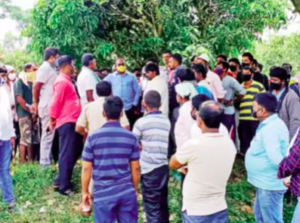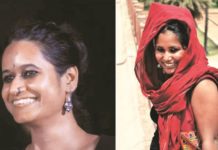In Karnataka, a man killed his daughter who was in love with a Dalit man. Six days after her body was recovered from Magudi tank, the police arrested her father charging him of murder. Honour killings have increased in the last three years, and this case reflects the situation.
The deceased girl was identified as B.com student, Hemalatha, who was in love with Puneeth, a Dalit farm labourer. Her father Krishnappa lodged a complaint on October 9th stating she was missing since the 8th. The next day, he said he told the police that he found her decomposed body in a pit near a mango grove.
The father lied to the police, accusing his daughter’s partner of killing her. Thankfully, the police charged him, along with two of her cousins for murder. They were 21 year old Chetan, alias Yogi, and a 17-year-old boy. The trio smashed her head with a boulder, and then took her to the mango grove. The two adults were arrested on Friday, but one of them, a minor, is under detention, officials said.
Though the trio initially insisted that the Puneeth killed the daughter, the police stated that they confessed upon further questioning. The police’s relatively swift action is remarkable as usually police cooperation is absent when seeking justice for honour killings.

SC/ST atrocities and honour killings in Karnataka
Though the very fact that they arrested is positive news, the conviction rate in Karnataka is abysmal, at 0.4% in SC/ST cases. As of March 2020, of the 9,702 cases reported, only 46 have led to the conviction.
At the same time, crimes against SC/ST people is the highest in Karnataka. While Uttar Pradesh reported the most cases in 2019 in terms of absolute number (2,309 cases and 2358 victims), the rate of cases- 5.6% per one lakh population of SC and ST people- was less than half of that of Karnataka, which was at least a whopping 12.8% for every one lakh people ( 1,298 cases and 1,520 victims).
Though Uttar Pradesh reported the most cases that year in absolute numbers — with 2,309 cases and 2,358 victims — the rate of cases was 5.6 per one lakh population of SC and ST members. Even though Karnataka reported fewer cases — with 1,298 cases and 1,520 victims — the rate was 12.8.
Some reports suggest that between 2011 and 2016, 13 people were murdered in honour killings. But according to recent reports in Tamil Nadu, 195 known cases of honour killings in Tamil Nadu alone. And, according to a report in 2015, between 2014 and 15 there was a rise in Honour killings by 796% across India.
While these don’t directly show what the rates of crime and conviction are for honour killings where the one killed is upper caste, they reflect the justice system’s response when it comes to crimes based on caste, as well as patterns of violence.
Why no data or law on Honour Killings?
There is a considerable lack of data on honour killings as “honour crime” is not a separate offence. Honour killings are charged under homicide or murder, and can be charged as conspiracies in cases such as these. Other cases of honour crimes are reported under many different charges, making them impossible to track. For this reason, NCRB also left data on honour killings out from its 2019 report, along with lynchings, stating it is too “vague”.
Lack of separate charges for honour killings also makes it easier for families to get away with the crime by destroying evidence in the name of cremation, and deeming it a suicide. Police wouldn’t look into these patterns as honour killings or crime. Though caste (or religion) is a major factor in the case at the level of arrest and conviction, it is not taken into account legally. “Honour crime” as a term is not even defined legally.
Lawyers and activists have been urging the Government to bring in a law which defines honour crimes- especially honour killings for years. In 2012, the Law Commission even submitted a report which outlines a unique legal framework for dealing with honour killings. The Prohibition of Interference with the Freedom of Matrimonial Alliances Bill would have criminalised the unlawful assembly of groups of people for the purpose of condemning a marriage or intimidation of a couple, curbing activities and behaviours associated with honour crimes. It also suggested protections for the couple and punishment for the accused.
However, no MP brought the Bill up in parliament. Politicians are afraid of upsetting Khap Panchayats, who have considerable political sway, and don’t want to upset them. Khap panchayat is the union of a few villages that mainly exists in North India. They often encourage honour killings of boys and girls of different religions and castes. For this reason, the Supreme Court had decreed in 2011 that they must be stamped out, though they continue to hold major importance in India. Most recently, they ordered the social boycott of an elderly man of 12 years for opposing child marriages.
Legally defining an honour crime and bringing in a law regarding the same wouldn’t just bring justice, but even save lives. As Bharati tells the Swaddle, “Honour crimes are usually not one-off incidents; there’s a lot that comes before the murder like verbal harassment, physical assault, coercion, and kidnapping. Having a separate law would define the things leading up to these crimes.”



























Mere report of crimes against SC/ST is of no use unless comparative data of crimes on other castes/communities is also revealed. Based on one-sided data, it cannot be said that SC/ST are alone victims of crime. This nonsense of terrorising society based on one-sided data has gone on for too long.